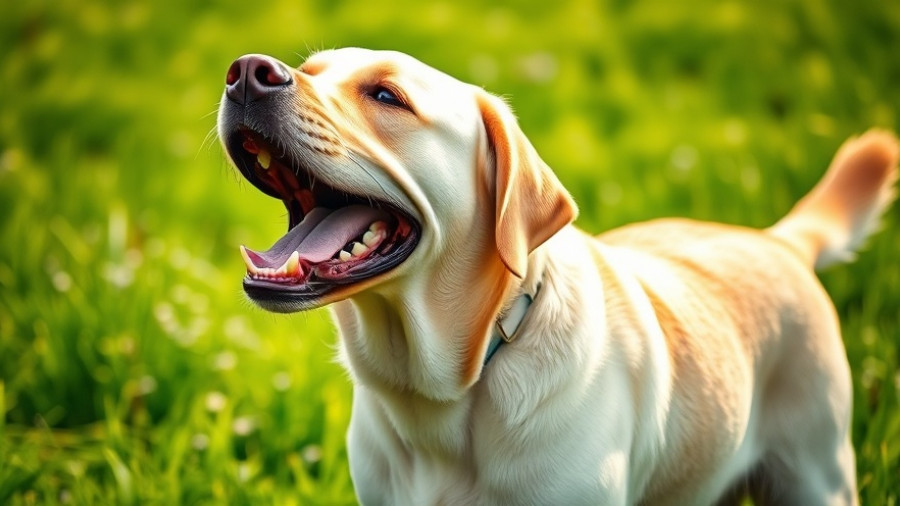
Understanding Dog Behavior: Is Your Pup Reactive or Aggressive?
As a devoted dog owner, you know that your furry friend’s behavior can sometimes raise questions. Is that barking a sign of aggression, or is your dog merely reacting out of fear or excitement? Understanding the distinction between reactivity and aggression is crucial in addressing any behavioral concerns your dog may display.
Recognizing the Signs of Reactivity
Dogs can easily exhibit reactivity when exposed to situations that trigger their emotions. A reactive dog typically showcases an exaggerated response, which can include barking, lunging, or intense fixation on a trigger, such as another dog or a stranger. For many pet parents, identifying reactivity is the first step on the journey to improving their dog’s social behavior.
For instance, if your dog barks incessantly at other dogs or people without making physical contact, it’s an indication of reactivity driven by underlying emotions like fear or frustration. In contrast, if a dog lunges with the intent to bite or cause harm, it crosses the threshold into aggression. This nuance is essential as it informs your approach to training.
The Spectrum of Aggression
Aggression in dogs is defined as the willingness to inflict harm or to threaten, distinguishing it from reactivity. For example, a dog that bites due to feeling cornered or threatened may be acting out of self-defense, while a dog exhibiting outright aggressive behavior to control a resource is acting with intent.
Understanding whether aggression stems from fear, frustration, or territoriality can help steer your interventions effectively. According to experts, recognizing the emotional root of aggression can lead to more successful behavior modification strategies. For example, if you know your dog is reacting aggressively due to fear, your first step might be to limit exposure to that fear-inducing trigger rather than just reprimanding the aggressive behavior.
Quiz: Is Your Dog Reactive, Aggressive, or Both?
This insightful quiz acts as a practical tool for owners to evaluate their dog’s behavior. By simply answering questions on whether your dog barks or lunges in reaction to triggers, one can begin to understand the scope of behavior displayed. The scoring guides you to determine if the dog is:
- 0–3 Yes Responses: Likely neither reactive nor aggressive; normal behavior with potentially minor stress.
- 4–7 Yes Responses: Mainly reactive; behavior rooted in fear or excitement that can improve with training.
- 8+ Yes Responses: Highly reactive; while not aggressive, the dog's reactions could escalate and warrant professional intervention.
The Importance of Early Intervention
Addressing reactivity and aggression early on is essential for the well-being of both your pet and those around them. Aggressive behaviors, if unaddressed, can escalate, leading to negative interactions with other dogs or humans. Professional training can help modify these behaviors, allowing your dog to build confidence and learn appropriate responses.
Engaging with a certified dog trainer or behaviorist can create a tailored strategy to manage triggers and reinforce positive behaviors. Techniques such as desensitization and positive reinforcement are effective in promoting lasting behavioral changes. Early intervention can also prevent future aggression and help maintain peace within multi-pet households.
Empathy in Training: A Heartfelt Approach
When dealing with reactivity and aggression, understanding your dog's perspective is key. Imagine the stress they experience during overwhelming situations—whether it’s a crowded park or an unfamiliar person approaching. Recognizing this emotional turmoil allows you to approach training with empathy and support, ensuring your furry friend feels safe while learning.
In conclusion, by understanding the dynamics of reactivity and aggression, you can foster a suitable training environment that promotes healthy behaviors. This awareness not only benefits your dog but also enhances your bond with them. Your journey in dog ownership can transform into a fulfilling adventure with the right tools and mindset.
If your dog displays significant reactive or aggressive tendencies, consider consulting a professional trainer to guide you on this journey. Furthermore, engaging in a community that shares your passion for dogs can provide resources and support that will help you nurture your beloved pet.
 Add Row
Add Row  Add
Add 






Write A Comment